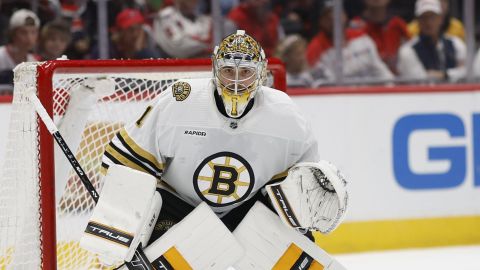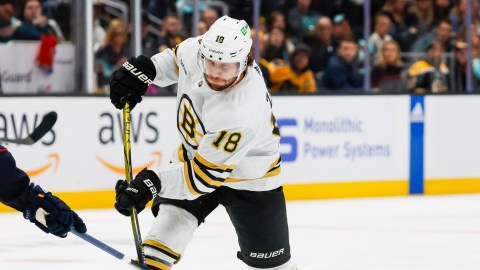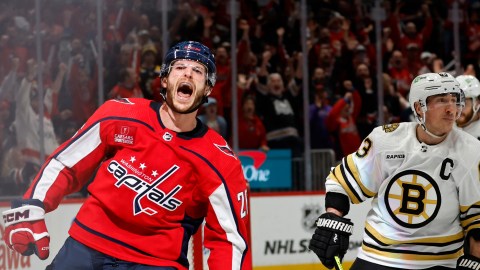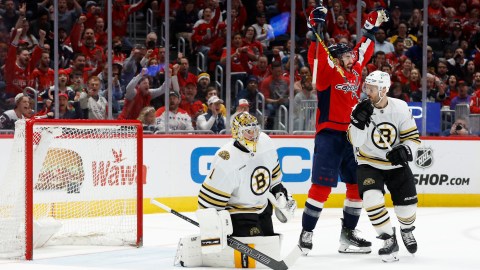Did anyone in the hockey world really expect head NHL disciplinarian Colin Campbell to come down hard on Penguins forward Matt Cooke for his vicious elbow to the head of Bruin Marc Savard this past Sunday? (I don't care what people say, Cooke had the chicken wing going and his elbow made contact.)
Maybe the general public expected a serious suspension, but as the week went on and Campbell and his cronies started to put the spin in motion with comparisons to the Mike Richards hit on David Booth, it became more and more obvious that Cooke would get off clean. Sure enough, word broke Wednesday that there would be no suspension for Cooke. And with that announcement, the league took two steps backward after having just taken a giant leap forward with the amazing competition (and ratings) at the Winter Olympics.
"No one likes when a player like Marc Savard goes down the way he did," explained Campbell. "No one likes when a player like David Booth goes down the way he did. But we have to be consistent.
"I know Matt Cooke is a repeat offender. He's been suspended twice in the last year,” Campbell pointed out. "[But] I can't suspend Matt Cooke for being a repeat offender. I have to find a reason. Right now our rules say that shoulders to head are legal. Matt Cooke did not jump, and did not do anything that we found illegal in his actions, even though, again, you don't like what happened.”
Really? You didn't see anything illegal? Then why did you and a group of NHL GMs — in the last few days, no less — propose and urge the NHL and NHLPA to make hits to the head illegal starting next season?
"A lateral, back-pressure or blindside hit to an opponent where the head is targeted and/or the principal point of contact is not permitted. A violation of the above will result in a minor or major penalty and shall be reviewed for possible supplemental discipline,” Campbell told the media on the same day he tried to justify the legality of such hits.
"We felt there is a degree of responsibility — more so to the player receiving the hit — when a guy's coming straight at you. But it's that blindside hit,” Campbell said, "that we find is so disturbing and it's tough to protect yourself in our game, with the speed.”
Campbell's view of the hit is wrong in my mind, because Cooke did show intent to injure. But in Campbell's definition of the hit, he is right, there is no actual infraction made. But why not make a strong statement and really back this proposal to ban these kinds of hits? Why not accept that Cooke made an extremely dangerous play, suspend him and avoid getting caught up in the semantics of the rules?
In a conference call with the media Wednesday night, Bruins general manager Peter Chiarelli tried his best to strike an optimistic tone regarding the progress the NHL made in proposing the new rule. It was an honorable thing to focus on, especially as his team's playoffs hopes remain in serious question. But Chiarelli couldn't disguise his true feelings.
"I'm both surprised and angered [with the decision not to suspend Cooke],” said Chiarelli. "The last couple days I've been lobbying Colin Campbell and the [NHL] hockey ops staff in regards to this shot on Savard.
"The issue here is that right now, there's no infraction for what Cooke did,” Chiarelli admitted. "He didn't leave his feet. He didn't charge. He didn't use an elbow. It was a shoulder hit to the head. It was a very surgical shoulder hit to the head.
"What I tried to convince the hockey ops staff was to take it outside the current rule and to use the repeat-offender criteria and implement an infraction of an intent to injure, so there you have your infraction. And that should distinguish this from the Richards-Booth hit. And that was the issue here. They didn't want to, and they couldn't distinguish it from the Richards-Booth hit. So I'm disappointed.”
Meanwhile, Chiarelli's top player and leading scorer from the past two seasons — a guy he recently signed to a seven-year extension — suffers at home. Meanwhile, his team suffers on the road, losing Tuesday night to the second-worst team in the league.
Chiarelli was asked about what may happen to Matt Cooke on March 18 when the Penguins come to Boston. Since there was no revenge exacted by the Bruins in the immediate aftermath of the hit on Savard, could something along those lines be a possibility next Thursday?
"I'm not going to comment on that. I want to talk to [the team] first,” said Chiarelli. "I was bewildered at the fact that one, there wasn't a penalty called, and I guess I was disappointed that there wasn't a reaction. I want to talk to the team. I know it's been frustrating, and it's been frustrating for me. I said earlier that I was disappointed and I'm going to speak with the team. … With regard to the team and their lack of response, that's something that I'm going to deal with.”
Most likely, though, it's something the players are thinking about now in Philadelphia as they prepare for Thursday's game against the Flyers. It's fair to assume that revenge will be served somehow, somewhere, because it always is.
But for a league looking to break that barrier and become relevant again in the United States, a lack of a league response to Cooke's hit may have caused it to take another step backward. Hopefully it won't go all the way back to 2004, when Todd Bertuzzi exacted revenge on Steve Moore for a similar hit that didn't have as much intent to injure.
Here's hoping the Bruins find revenge, but in a different manner. If that's not the way it works itself out, though, Colin Campbell and the NHL have no one to blame but themselves.



